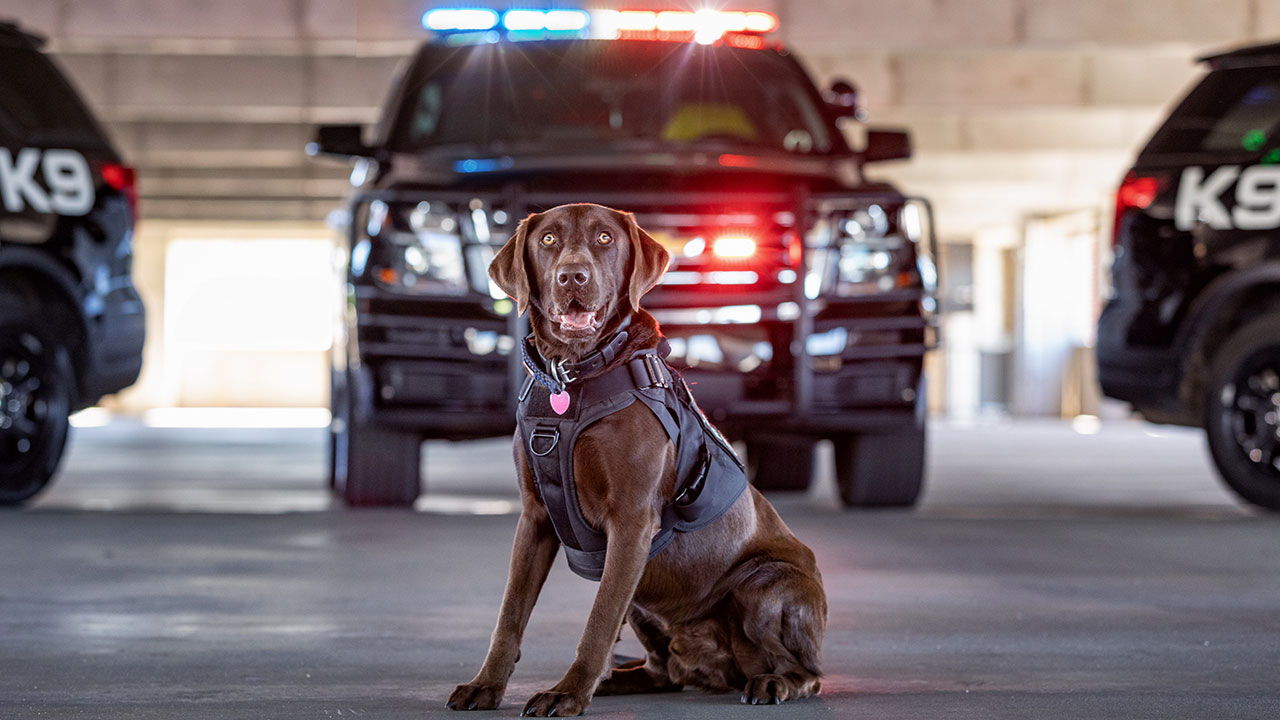content body
A special group of people at Auburn University are working hard to make the world a safer place, one four-legged pooch at a time.
Through Canine Performance Sciences (CPS) — a program dedicated to breeding, training, research and technology transfer of talented dogs — the university is placing the elite animals in communities across the country. Whether it is serving as a K-9 officer, working to detect illegal substances, firearms and explosives, serving as school resource agents or providing a variety of law enforcement functions, the Auburn University Dog — a trademarked brand — continues to be a valuable asset to Americans from coast to coast.
“CPS is a uniquely comprehensive program of research, development and technology transfer to the operational community,” said Paul Waggoner, CPS’ director and an adjunct associate professor in the College of Veterinary Medicine (CVM). “Because we not only perform research but also produce detection dogs that matriculate through Auburn to operational careers, and because we engage in technology transfer and outreach to the operational community, CPS has a strong bridge to a network of end users of our dogs and technology.”
The program has bred, prepared and placed hundreds of dogs throughout the country in the last 25 years, including Auburn High and Junior High schools, Lee County law enforcement and even the New York Police Department. Four of the dogs — Pongo, Edgar and Ruthie in Southern California and Las Vegas, as well as Bagheera at Gulf Shores Police Department — have their own Instagram accounts.
“In addition to explosives detection, our dogs are employed for varied tasks, such as ecological surveillance of endangered or invasive species, search and rescue, trailing of criminal suspects and lost persons and detection of electronic storage devices to protect security sensitive data as well as aid in criminal investigations,” Waggoner said.
Community difference-makers
Most recently, CPS’ Roxy was donated to the DeKalb County Board of Education as a firearms detection K-9 in April. The chocolate Labrador retriever already has been making a difference as a member of Geraldine High School’s security team.
In February, CPS placed Dexter with the Los Angeles Sheriff’s Department. The yellow Labrador was selected and then trained by Robert “Noz” Noziska, a retired Special Operations Supervisor for the U.S. Border Patrol Special Operations Group.
“The combination of Auburn University Dog, Noziska and LA County are the unique, leading-edge detection canine activities representing our prominence in detection canine technology,” Waggoner said. “It is outstandingly fulfilling to see a first responder with an Auburn University Dog knowing that we’ve collectively enhanced the capability of that responder and dog team to interdict threats to the safety and security of the U.S. and its allies.”
Collaborations within CVM and across campus, as well as external research and canine training partners, help extend and amplify CPS’ capabilities.
“Chief among this network are those programs employing the Auburn-patented Vapor Wake detection methodology and customers for the Auburn University Dog, such as the Arlington [Texas] Fire Department, Orlando Police Department, Amtrak Police, the NYPD Counterterrorism Bureau’s K9 Unit, NSA Police and the TSA,” Waggoner said.
“Our commercial Vapor Wake licensees — such as Global K9 Protection Group based in Opelika, Alabama, and the K9 Guild based in Florida — provide Vapor Wake dog-handler team training for law enforcement organizations and Vapor Wake dog-handler team services. They protect large event venues for the NBA, NFL and Major League Baseball, as well as for concerts and other potential high-value targets of terrorism.”
Research powering program
At its core, CPS is a detection canine science endeavor with a breeding and development program with roots dating back to 2001. The program consolidated Auburn interrelated canine research and development efforts in 2013 to include detection canine production and development within CVM to streamline its reach and goal set.
“Our mission is to innovate detection canine technology by exploring basic and applied research frontiers in olfaction, behavior, genetics and physical performance and transfer that technology to the operation detection canine community,” Waggoner said. “We make a concerted science-based effort to produce dogs with characteristics that make them ideal for performing the Auburn-patented Vapor Wake method for detection of person-borne threats.
“We are conducting research regarding how best to prepare, train and provide for the welfare of detection dogs. Like human athletes, the physical and behavioral health of the detection canine is critical to optimizing its performance.”
CVM and CPS researchers are teaming with the School of Kinesiology and others to study behavioral, physical and genetic markers that signify the greatest chance for canines to achieve success and longevity as detection dogs. They also are examining variables such as environment, the interaction between dogs and their handlers and the intricacies of the animals’ olfaction systems.
Versatility is one of the program’s strengths, producing dogs capable of a seemingly endless array of functions and duties.
“The Auburn University Dog has the attendant quality of being extremely versatile,” Waggoner said. “Demonstrated through our research and the practical results of operational deployment, the Auburn University Dog is a detection dog with reliably elite capabilities.”
Auburn's Vapor Wake program offers a unique approach to canine detection.










